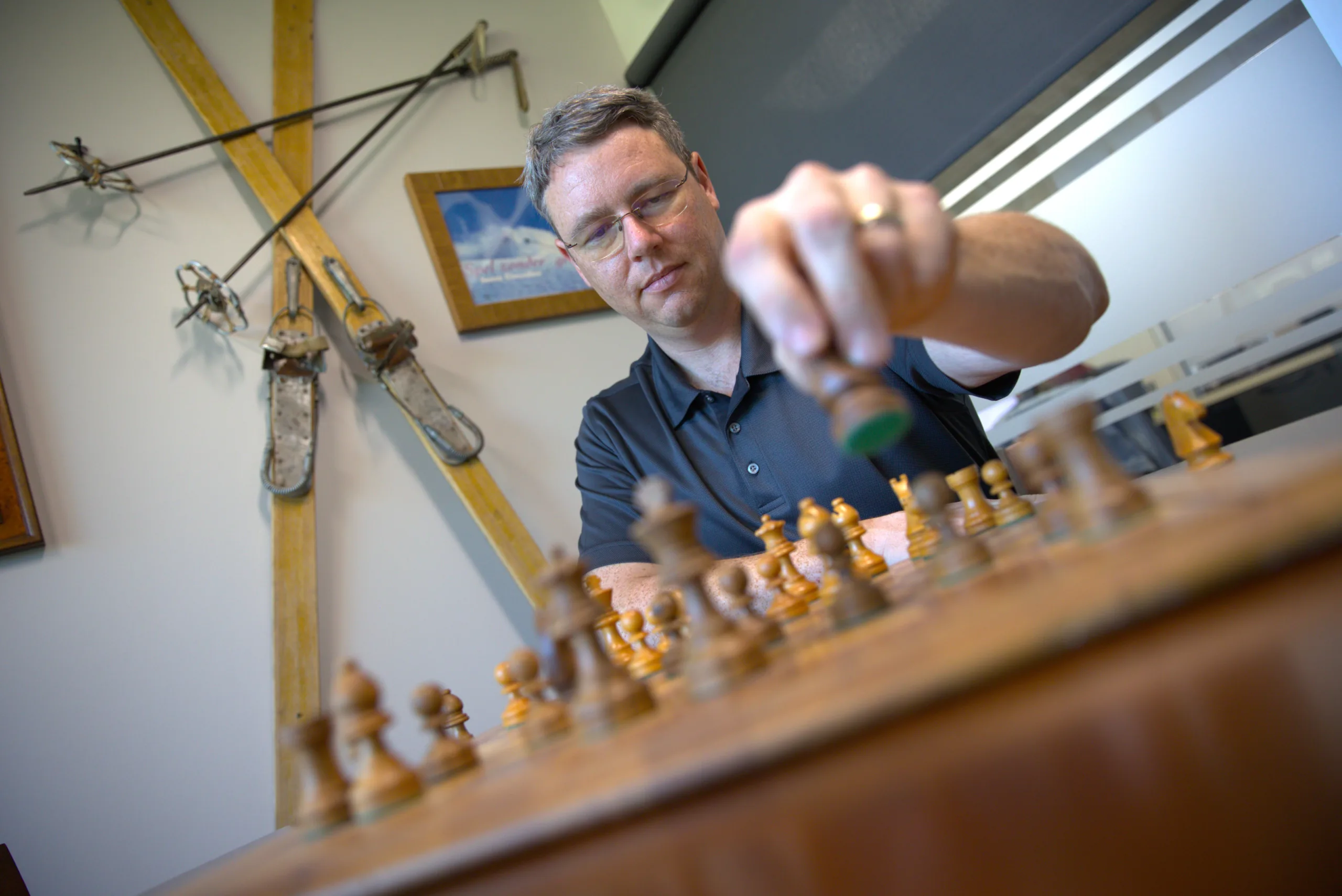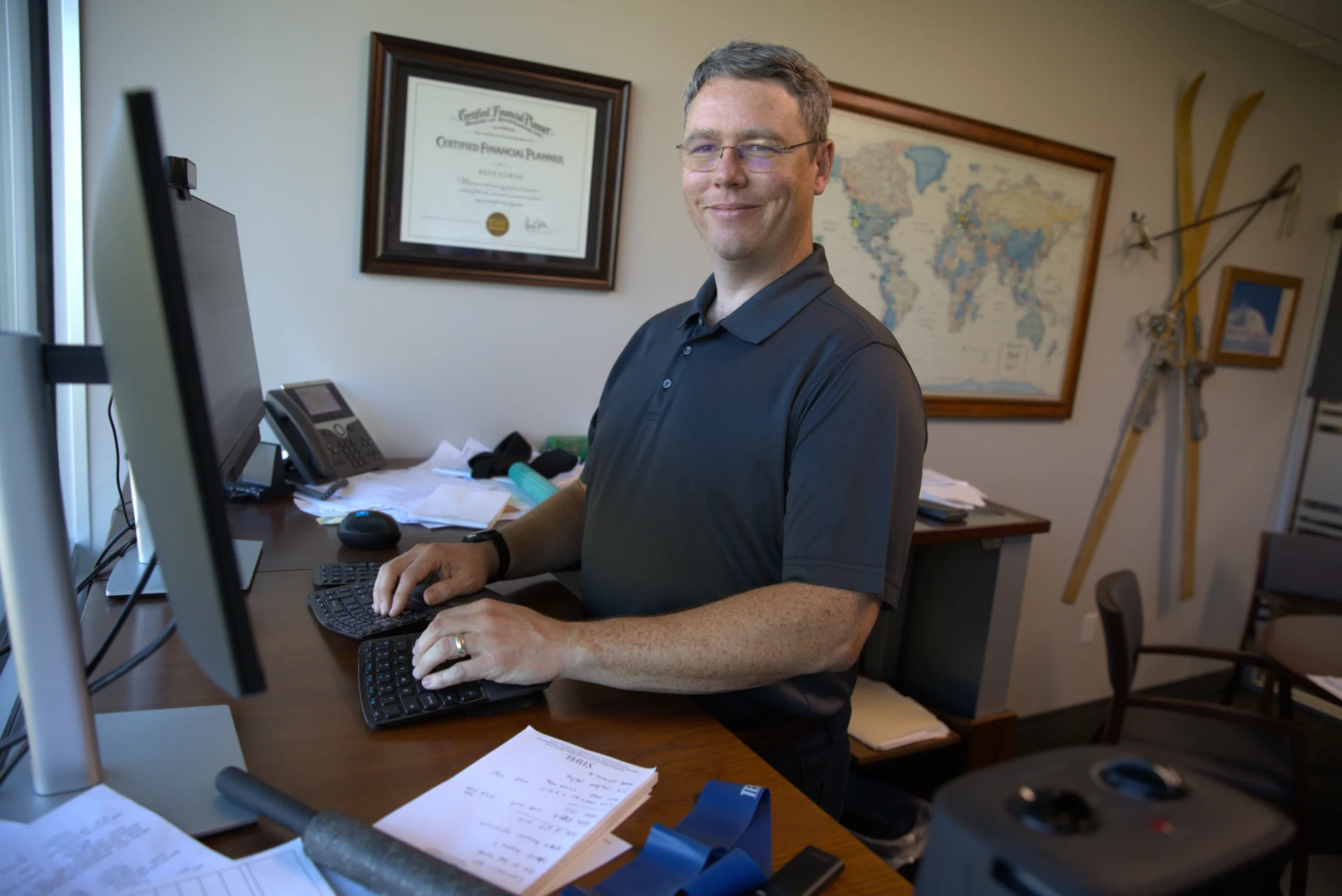Finance Alumnus Ryan Curtis Wants Future Students to Learn the Lessons He Gained in the Student Managed Portfolio Class

Ryan Curtis, an Orfalea College of Business alumnus, has paid it forward with a gift of securities. (Photo illustration/Sarah Davenport)
When he first watched the comedic film “Trading Places,” Ryan Curtis, ten years old at the time, was confused by the investment talk.
The 1983 movie features a wealthy commodities broker (Dan Aykroyd) and a poor street hustler (Eddie Murphy), whose paths unexpectedly cross when an elaborate bet tests how each man would fare if their circumstances were swapped.
“I told my dad, ‘I don’t understand what’s going on,’” Curtis remembered. “He didn’t understand commodities trading, but he explained it in terms of the stock market. And I said, ‘Well that makes sense – I want to do that.’”

Chess and skiiing are among Ryan Curtis’s many hobbies. He began investing as a hobby at age ten. (Photo/Pat Pemberton)
After taking two quizzes using Quicken software, the elementary school student withdrew $2,000 he had saved from Christmas money and allowance and invested in a Putnam Voyager B mutual fund.
“In retrospect it was probably not the best way to make an investment decision,” Curtis said. “But as a ten-year-old it seemed reasonable. At the end of the day it got me invested in the market.”
With further education from Cal Poly, which included multiple courses with current Finance Chair Cyrus Ramezani and the hands-on Student Managed Portfolio Project class, Curtis eventually turned that hobby into a career. And now Curtis, a first vice president of investment at wealth management firm Stifel, wants to help others pursue that passion by offering a securities gift in excess of $100,000.
“I feel like I got a significant amount of value in my life from Cal Poly and from Cyrus,” said Curtis, who lives and works in San Luis Obispo. “And I had the opportunity to be charitable.”
Curtis grew up in Truckee, Calif., near Lake Tahoe, the son of two parents who were in real estate. While he had multiple hobbies, including skiing, computers, and karate, he quickly took to investing – which his father incentivized by matching every dollar Curtis invested.
“Even as a kid that was too good to pass up,” Curtis said.
At 16, his investments paid off when he used his money to purchase a used Ford F-250 pickup truck with a 6-inch steel bumper and a winch. Not long after that, Curtis began studying finance at Cal Poly, which he chose for its friendly culture.
Keeping with Cal Poly’s Learn by Doing approach, the Orfalea College of Business offers a Student Managed Portfolio Project class to provide students a hands-on financial management experience. The course allows students to make investment decisions on a half-million-dollar investment portfolio with the Cal Poly Corporation.
“When it’s real money and not just putting together a spreadsheet for a class, all of the sudden it matters,” Curtis said. “Having real money impacted by the decisions you’re making, I think, creates a lot more weight to making those decisions.”
Ramezani said using real money focuses both students and faculty.
“Other practicalities associated with real money funds include learning about and applying concepts, such as record keeping, quarterly reports, performance benchmarking, efficient trade execution and sometimes managing illiquid assets,” he said. “These are valuable, real-world opportunities and quintessential Learn by Doing exercises.”

At Stifel’s San Luis Obispo office, Ryan Curtis helps clients make wise investment choices. (Photo/Pat Pemberton)
During the class, each student is assigned an industry to specialize in and a specific company to focus on. Every student makes suggestions to the investment committee – the entire class –- which then votes on investment decisions.
There are guardrails – the course instructor actually administers the recommended actions, which usually entail less risky decisions.
“Some years the class is going to do better than other years,” Curtis said. “But, by and large, markets trend upwards over time.”
The experience taught Curtis the importance of acting on convictions.
“When dealing with meaningful sums of money, you can be scared to make a mistake,” he said. “And that fear of ‘I might do something wrong’ can prevent you from taking any action, and that in of itself is a mistake.”
As a student, Ramezani remembers, Curtis had a knack for attention to detail, quantatative skills and an openness for new ideas.
“I think these traits remain with him today and serve as the foundation for his success in business and his personal life,” Ramezani said.
While Curtis was interested in becoming a financial analyst, those jobs typically require relocating to big cities. And he had come to enjoy the SLO Life. So he began his career at Edward Jones in San Lus Obispo as a financial advisor and joined the local Stifel branch in 2012, where he helps clients achieve their long-term financial goals through a comprehensive planning process.
When it’s real money and not just putting together a spreadsheet for a class, all of the sudden it matters
— Ryan Curtis
“I find the interaction with clients to be rewarding,” he said, noting that some clients have invited him to retirement and house-warming parities as a show of appreciation for his help achieving financial goals.
While the Student Managed Portfolio Project class taught Curtis not to fear investing, he’s also careful to minimize risk. In his career, he encourages clients to focus on the long game as opposed to the quick – and rare – big money maker.
“Focus on the income need, not on the principal value.,” he advises clients. “Focus on your cash flow not your bottom-line number.”
These are lessons he hopes students will learn in the Student Managed Portfolio class he is supporting. While his gift will bolster experiential learning, he also has taught the class and visited finance classes as a guest speaker.
“It was a fun opportunity to be able to help the students,” Curtis said. “I like talking about investing, and I like talking about portfolio construction.”
He’ll likely talk about investing with his own children whenever they watch “Trading Places.”
“While I haven’t re-watched the movie ‘Trading Places’ for about 25 years, I will always have a soft spot in my heart for the movie,” Curtis said. “I will probably watch it with my kids someday in the not too distant future, and I am looking forward to that.”
***
Securities and mutual funds that have increased in value and been held for more than one year are popular assets to use when making a gift to Cal Poly. Making a gift of securities or mutual funds offers you the chance to support our work while realizing important benefits for yourself. To give a gift of securities or mutual finds, reach out to Kelly Dye, executive director of development and external relations at kedye@calpoly.edu or 805-756-0740.
